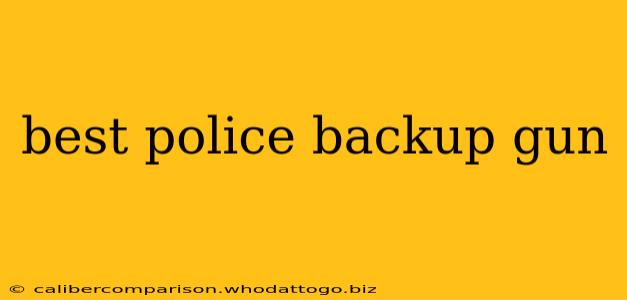Choosing the right backup gun is a critical decision for law enforcement officers. Your life, and the lives of others, may depend on its reliability and effectiveness in a high-stress situation. This guide explores factors to consider when selecting a backup gun, and examines some top contenders currently favored by officers in the field. We will delve into caliber, size, capacity, reliability, and other key features that make a firearm suitable for this crucial role.
Key Considerations When Selecting a Backup Gun
The ideal backup gun is a balance of several crucial factors:
1. Caliber: Stopping Power vs. Concealability
The caliber debate is ongoing. While larger calibers offer greater stopping power, they often come with more recoil and increased difficulty in concealment. Popular choices include:
- 9mm: A common and effective choice, offering a good balance between stopping power, capacity, and manageable recoil. Its widespread availability and affordability are also attractive.
- .380 ACP: A smaller, lighter round ideal for deep concealment, though its stopping power is less than 9mm. It's a good option for officers prioritizing concealability.
- .45 ACP: Provides significant stopping power but with increased recoil and larger size. Often chosen when maximum stopping power is prioritized over concealability and ease of carry.
- .40 S&W: Falls between 9mm and .45 ACP in terms of stopping power and recoil. It's a viable option, though its popularity has waned somewhat in recent years.
2. Size and Weight: Concealment and Carry
The backup gun must be easily accessible and comfortable to carry. Consider:
- Subcompact pistols: These are designed for deep concealment, often sacrificing capacity for size.
- Compact pistols: Offer a balance between concealability and capacity, providing a good compromise for most officers.
- Weight: A lighter gun is easier to carry, but heavier guns can reduce felt recoil.
3. Capacity: Rounds on Tap
Higher capacity means more shots before a reload, a significant advantage in a firefight. Consider the tradeoff between capacity and size/weight.
4. Reliability: Function Under Pressure
The firearm's reliability is paramount. Choose a reputable manufacturer known for producing dependable and durable firearms. Regular maintenance and cleaning are crucial for ensuring consistent performance.
5. Ergonomics: Comfort and Control
The gun must fit comfortably in your hand and be easy to operate under stress. Consider grip texture, trigger pull, and sight design.
Top Contenders for Best Police Backup Gun
Many excellent options exist, but several consistently appear at the top of officers' lists. (Note: This is not an exhaustive list, and specific preferences vary based on individual needs and body type). We are not endorsing any specific brand or model. Thorough research and hands-on testing are crucial before making a decision.
- Compact 9mm pistols: Many manufacturers produce reliable and easily concealed compact 9mm pistols. These often provide a good blend of capacity, stopping power, and ease of carry.
- Subcompact .380 ACP pistols: For officers prioritizing extreme concealability, a subcompact .380 might be the best option. This choice usually necessitates a tradeoff in stopping power and capacity.
Beyond the Firearm: Training and Practice
The best backup gun is useless without proper training. Regular practice drills focusing on quick draw, target acquisition, and reloading are essential for proficient use.
Choosing the right backup gun is a personal decision. It requires careful consideration of individual needs, departmental policies, and training. Remember, the most critical factor is the officer's ability to deploy the weapon effectively and accurately under pressure. This guide should serve as a starting point for further research and exploration to find the optimal backup gun for your specific circumstances.

